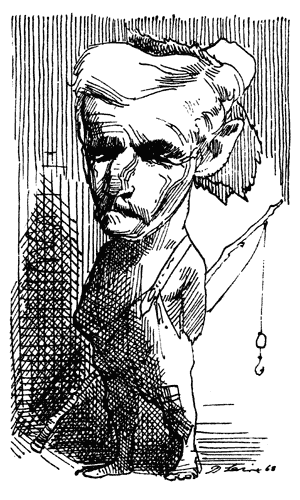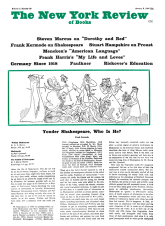After decades of the bowler-hat and furled-umbrella literit that made his academic reputation, Cleanth Brooks has reverted with a rebel whoop to the Confederacy. His Faulkner book is a Southern blend of vitriol, tart courtliness, regional piety, genealogies back to Adam, the stupefying trivia of life in a small town, and uninhibited hero-worship. It gives the hard back of a gloved hand to those Northerners who have presumed to elucidate Faulkner’s home country; it turns about to congratulate fellow-Southerners on their perspicacity in similar but unpresumptuous attempts; with energetic sarcasm it defends Faulkner against charges of condescension toward Negroes, contempt for poor whites, romanticism, sensationalism, restrictive provincialism, symbol-mongering, imperfections of structure and technique; it is intransigently enthusiastic about novels—Sartoris and The Unvanquished, for instance—that even devotees of Faulkner have been content to set aside as poor or minor.
The book is, like its subject, both formidable and provincially eccentric. Brooks’s thesis is that Faulkner, having had the luck to live in a society which retained “the sense of community,” had also the talent and intelligence to make use of this society and its “funded wisdom,” not only as the setting for the turbulent careers of his characters, but as the unifying ground of his fiction:
The community is at once the field for man’s action and the norm by which his action is judged and regulated. It sometimes seems that the sense of an organic community has all but disappeared from modern fiction and the disappearance accounts for the terrifying self-consciousness and subjectivity of a great deal of modern writing [observe, by the way, the slitheriness of this sentence: in Clause One, the pursemouthed reservations of “sometimes seems” and “all but disappeared”; in Clause Two, the “disappearance” magically transformed into obvious fact].
Faulkner’s “folk society that…goes on in its immemorial ways,” that “is neither sick nor tired,” that “has all the vitality of an old and very tough tree,” is sustained by a decent respect for neighbors and ancestors and family, by a saving humor; above all, “firmly supported by its religious underpinning” (“a still vital religion with its cult, creed, and basic norms of conduct”), of which Brooks gives Dilsey’s “simple religious faith” as a signal instance. In Absalom, Absalom! Thomas Sutpen’s fatal defect, according to Brooks, is “peculiarly the innocence of modern man. For like modern man. Sutpen does not believe in Jehovah”; and so Sutpen falls, in a sort of unwitting blasphemy that Brooks is at pains to explain as not Southern, as against the very grain of Southern life. (The note of tub-thumping zeal for “traditional,” Southern Protestant Christianity—counterweight to “the modern world of the lunatic irrational”—vibrates throughout the book; Brooks is proselytizing as well as describing, his lectern keeps threatening to metamorphose into a pulpit.)
Brook’s thesis is, of course, not original; it has been anticipated in most of the critical writings on Faulkner; it was not at its first appearance very rich and startling. Brooks is formidable, not because he has invented a thesis or even because he has borrowed a formidable one, but because the one he has chosen he presses on all fronts, with the obsessive vehemence of a man declaring finally where he stands, because he waves sheaves of documents in evidence, because he has taken the trouble to read and virtually memorize his texts as if they were holy writ. Or, rather, his single and singular text; for Brooks treats all the Yoknapatawpha novels as if they constitute the intersecting and complementary records of a whole and separate world, which exists in indefinitely accessible depth beyond depth for the judicious anthropologist-critic. How many children had Lady Macbeth? Brooks, early, disclaims any such interest: “Faulkner’s novels have too often been read not as fiction but as factual accounts, with the notion that they represent only slightly distorted pictures of Southern rural and small-town life.” Yet in practice Brooks is certainly eccentric, and appears almost hallucinated, in his assumption that Faulkner’s people are real: “Narcissa is a shy girl, diffident, anxious to maintain her reserve, and yet something more than shyness and inertia is probably involved”; “Some years ago one of my students showed me a copy of a letter from Faulkner in which he replied to another student who had asked him whether Caddy and Quentin did commit incest. Faulkner writes that they did not…”; “Even if Linda were not an ideological Communist—and she probably is not—“; “What happened to Clarence? Who gave him the beating? Again we only conjecture.” The hallucination goes so far that, of the character Judith, whose actions are summarized or barely alluded to in Absalom, Absalom!, who speaks almost never and is at best a necessary prop of the plot, Brooks says that “she is one of Faulkner’s finest characters of endurance—and not merely through numb, bleak Stoicism but also through compassion and love.” Brooks has soared beyond criticism and is ready to tell us about the Macbeth children, their names, birthdates, and present addresses.
Advertisement
Such clairvoyance will not seem implausible to anyone who has burrowed through Brooks’s minute reconstructions of plot, genealogical tables, maps, chronologies, surmises about the reliability of one date or another as given in one novel or another, catechisms (for that most tortuous of Faulkner’s novels, Absalom, Absalom!) of what we know and how we learned it, what we infer and how we arrived at it, who told us and when, what we guess and by what evidence. Not that he has had to do all the work: at one point Brooks salutes the authors of an essay on Faulkner for having “provided a plan of the Compson house and a map of the Compson property down to the woodpile, the pigpen, and the ditch in which Nancy’s bones repose”; and he concludes that “students of the The Sound and the Fury will find this material interesting and in many ways useful.”
Brooks is concerned to support his case with authorities; but, again, his procedure is eccentric, is indeed a confoundingly gauche indulgence in name-dropping. In order to elevate Eula Snopes and Gavin Stevens to a European and mythical magnitude, Brooks abruptly introduces Denis de Rougemont’s Love in the Western World:
One of the section headings of Rougemont’s book is entitled [sic] “Marrying Iseult?” Marriage with Iseult is inconceivable, for to marry her is to have her “dwindle into a wife,” as Congreve’s Millamant phrased it. Or as Rougemont puts it…
“When Faulkner,” Brooks resumes later, “writes that Quentin ‘loved not his sister’s body but some concept of Compson honor,’ he might be quoting from Rougemont, though in all likelihood he never read Love in the Western World.” Or: “Faulkner may or may not have read Tawney’s Religion and the Rise of Capitalism; but on the evidence of Absalom, Absalom! he would certainly have understood it.” Or: “A depth psychologist could doubtless do a lot with this passage, but the sensitive layman is able to get much of the force of it without professional help…” Or: “Edmonds [a character in “The Bear”] might actually have been remembering—though it is improbable that he was—Keats’ famous statement to his friend Bailey…” One is tempted to roll one’s own: “Hamlet may or may not have been remembering—though it is unlikely—Schopenhauer’s animadversions upon women”; or, “Freud would have got a real bang out of this scene, though any intelligent neurotic can enjoy it up to a point.”
Let us continue to be accurate. Brooks’s admiration is at times discerning, notably when he leaves his authorities off stage, when he stops crying up into masterpieces such shallow genre paintings as Sartoris and The Unvanquished, when he renounces the puzzling out of inconsistencies in characters or chronology from novel to novel. The Sound and the Fury (especially the superb Jason section), As I Lay Dying, and Light in August Brooks discusses with clarity, proportion, and a convincing designation of their virtues. He is equally convincing on Faulkner’s talent for both amiable and grotesque comedy, on Faulkner’s sympathetic examination of the nuances of honor among the Negroes and the poor whites, on what might be called Faulkner’s colloquial manner.
Strangely enough, what Brooks never faces (though he may in time, since he warns us that he is producing still another book on Faulkner) is what immediately strikes the wary reader: Faulkner’s rhetoric, Faulkner’s grand manner, the manner to which he is as momentarily liable as a dog is to fleas, and which he bestows with special unction upon his brooding and morbid plantation aristocrats. The everlasting exemplar is Absalom, Absalom! Brooks patiently unravels its enormously complicated plot without once referring to the barbed-wire entanglements of trailing syntax that are responsible for most of one’s sense of enormous complication (not to speak of the suspicion that unwarranted demands are being made on one’s attention). Nor are the problems of the grand manner resolved even when it is less decisively inarticulate.
It is not so much a question of bad syntax as of strain and excess. Faulkner’s events will not bear the weight of meaning that the pretensions of his manner impose upon them; and all of Brooks’s nervous dropping of names like Sophocles, Wordsworth, Milton, Congreve, Rollo May, Arthur H. Schlesinger, Sr., and Rougemont will not persuade us that Thomas Sutpen is Oedipus or Lucifer, that Eula Snopes is Helen or Iseult. Faulkner has the arrogance of the provincial. Whatever happens in Yoknapatawpha County is important, and if it doesn’t seem so in fact he will make it so by force of rhetoric. But Jefferson, Mississippi is not Athens or Rome. The mode of pathos is not the mode of tragedy, and a style which pretends that pathos can stretch to tragedy on the tiptoes of rhetoric will not only miss tragedy altogether but may fall back into the irreclaimable bathetic.
Advertisement
Faulkner’s resemblance to Mark Twain has often been noted. It is a significant one. Both are Southern provincials. Both are masters—the supreme masters—of Negro and poor-white Southern dialects, of tall-tale and folk comedy, of a brilliantly artless folk-narrative eloquence. Both are susceptible—as provincials usually are—to stunning lapses of taste and judgement. And it is pertinent to add that to be a provincial in America is to be the fraction of a fraction.
Faulkner, to be sure, is much the superior novelist. As I Lay Dying is a poignant gargoyle of a novel, in which for once the rhetoric rings like steel (most astonishingly, in Addie’s monologue); Light in August is, as Brooks says, a kind of sinister pastoral, impressive in its fluidly contrapuntal treatment of a very complex plot; The Sound and the Fury is a fascinating tour de force, of which at least the last two sections are very fine; even Absalom, Absalom! occasionally crawls out from under its purple passages to reveal as by a lightning-flash the enigmatic figure of Thomas Sutpen, who—though no Oedipus—is as large a creation as Faulkner’s world will natively tolerate. Gide, asked to name the greatest French poet, replied: “Victor Hugo, alas!” To the question, Who is the greatest American novelist? “William Faulkner, alas!” is a rather ungracious answer and one that will probably not satisfy Cleanth Brooks. Still, in the long run, it may have to stand.
This Issue
January 9, 1964




